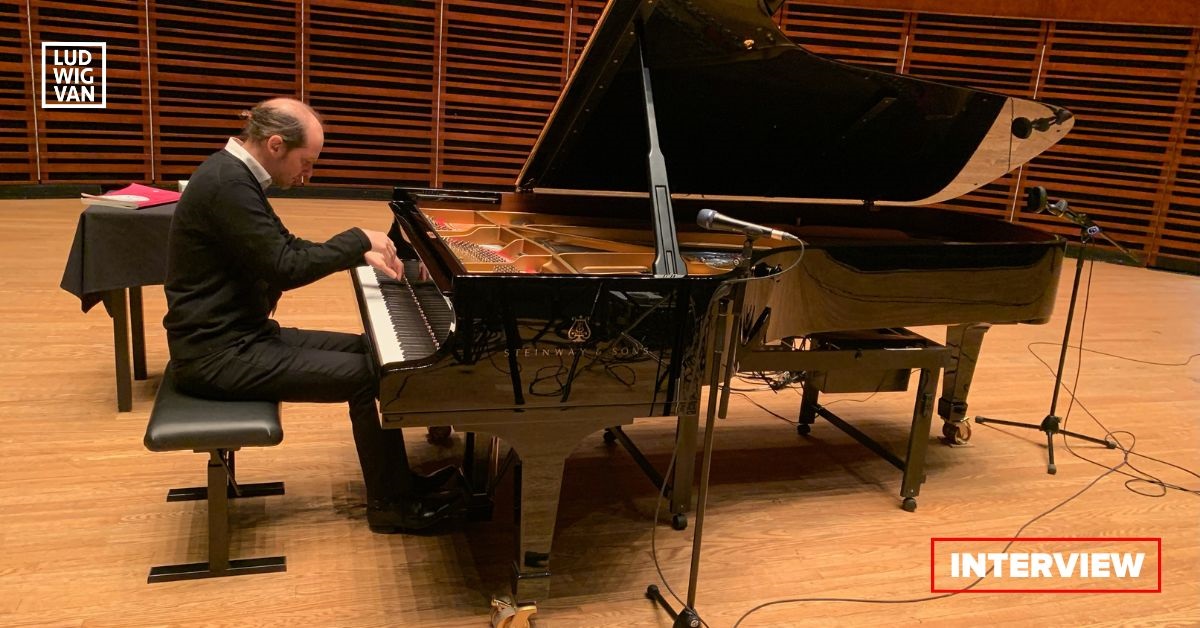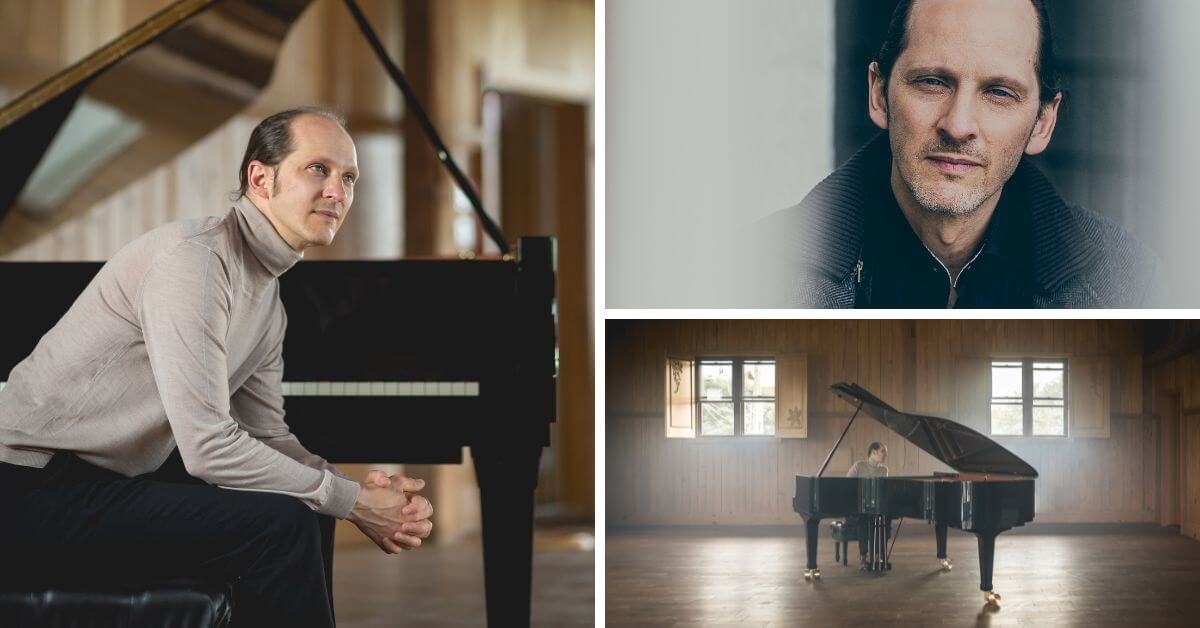
Montréal based pianist Mathieu Gaudet will be performing a program of Schubert when he visits Toronto for his recital with Mooredale Concerts on April 2.
“My soul is very close to German music at the beginning of the 19th century — Schubert, Schumann, Brahms are really my favourite composers,” he says.
When it comes to Schubert in particular, it was a part of the repertoire he began to fully explore later in his studies. The length of his pieces, he points out, makes them difficult to play in a school recital. He truly began to delve into Schubert’s music when he got to the Master’s level of his studies, and learned new pieces voraciously. “I started to organize concerts where I’d play almost all of his piano music at once,” he recalls.
That’s what led to his decision to embark on a massive project as a recording artist. He’s in the middle of a process of recording all of Schubert’s works for piano at a rate of two releases per year on the Analekta label.
“I just recorded volume 8 in November. It’ll probably be a 14, 15 CD project. It’s about halfway through,” he says.
From Schubert Vol. 6:
Mathieu Gaudet
Many musicians have other careers out of necessity or circumstance. Mathieu Gaudet is a relatively rare case of someone with two careers where he is fully at home, and by choice.
Born in New Brunswick, he grew up on the East Coast in Gaspésie and Bas-Saint-Laurent. After secondary studies in both science and music, he began serious study of music at the Rimouski Music Conservatory.
- From there, he went on to the Peabody Institute (Baltimore) for a master’s with Julian Martin;
- He then studied in Toronto at the Glenn Gould School of Music (Toronto) with André Laplante, Marc Durand, and John Perry, along with master classes with Leon Fleisher;
- In 2007, he returned to the University of Montréal for a doctorate in performance, followed by a master’s degree in conducting with Jean-François Rivest;
- He also, and at the same time, began his medical studies, which he took up from age 27 to 35.
Mathieu recalls attending his medical lectures and labs, and then walking to his piano studio to play for a few hours between classes. His family background is in the medical field, and his wife is a family physician.
Today, he works as an emergency room physician at the Brome-Missisquoi-Perkins Hospital, dedicating his off days to music, and juggling his schedule with performing tours.

The program
Some of the repertoire he’ll play in Toronto represents music he first learned in his teens. Even at that age, he knew it spoke to him. “I feel like it’s music that is very sincere,” he says. “I’ve never really been into fireworks and virtuosity. I’m much more attracted by a romantic message.”
The program includes Schubert at varied points in his career,
- Twelve German Dances, Op. 171;
- Piano Sonata No. 19 in C minor, D. 958;
- Two Scherzos, D. 593;
- Four Impromptus, Op. 90, D. 899 (First book).
The Impromptus and Sonata No. 19 contrast the early Scherzos. “It’s late Schubert,” he says. “He wrote these pieces just before he died. They’re really masterworks. At once, they’re really touching, and really deep, but the structure is amazing.”
The pieces are challenging in various ways. “The C Minor is a particular big deal, it’s something like 750 measures long. It’s a bit like a crazy horse,” he says. “The slow movement is so singing. The first movement is so stark — it’s a bit like Beethoven.”
He’ll be playing from the first book of the Impromptus. “They’re like songs without words. Everybody knows them for good reason. I love playing them. For me, they’re not like salon music, they’re deep and philosophical.”
Immersing himself in Schubert’s piano compositions has meant that his understanding of his works is an ongoing process, too. “I do feel there’s really nothing like learning a composer’s whole oeuvre.” He says he doesn’t understand the attitude of choosing only one or two pieces to learn from a composer’s oeuvre. “When I play a composer, it’s very crucial for me to know what I’m talking about.”
“There’s quite a striking difference between the young Schubert and the late Schubert,” he says, without regarding either as necessarily superior. “Even when he was young, he already had this very deep soul.
The early compositions, however, as he notes, weren’t quite as deep as they would become. If he recognizes a youthful Schubert’s voice in the Scherzos, for example, it’s something he considers in performance. “Should I be more fun with it?” he wonders of the earlier works. It’s one of the questions he’s still exploring.
Brahms himself was fond of Schubert’s Twelve Dances, as he notes. “Schubert put his complete heart in it.” Completed in 1823, they represent a midpoint in his too-short career. “It’s a great interlude between the two massive pieces.”
His approach to learning any piece is to begin with its overall conception. “It’s important to me to know what the music is saying. There’s a story.” Only once he’s fully grasped both the technical and narrative nuances of the piece is he ready to bring it to the public. “It needs to belong to me in a way before it’s on stage.”
“I have this big perspective, but it’s not really that I’ve found a definite answer,” he explains. “It’s always sort of a moving target. I feel like, as I play the whole thing, I have more perspective, I have more tools.”
That’s where the music comes from. “If we find the answer, we stop playing it,” he says. “It’s really fun.”
Tickets for the April 2 concert at Walter Hall, (Edward Johnson Building, UofT ) as well as the afternoon Music & Truffles concert for Kids (also featuring Gaudet) are on sale [HERE].
#LUDWIGVAN
Get the daily arts news straight to your inbox.
Sign up for the Ludwig van Daily — classical music and opera in five minutes or less HERE.
- PREVIEW | SUMMER OPERA LYRIC THEATRE Presents Handel’s Xerxes, Mozart’s Idomeneo & Puccini’a La Boheme July 26 To August 4 - July 26, 2024
- PREVIEW | YENSA Festival V.2 Offers Black Flames Performances & Other Ways To Celebrate Black Women In Dance - July 25, 2024
- PREVIEW | Canadian Talent Conspicuous In The Met: Live In HD 2024-25 Season - July 25, 2024



